Unit 9 Can you come to my party? Section A(Grammar Focu-3b)课件
文档属性
| 名称 | Unit 9 Can you come to my party? Section A(Grammar Focu-3b)课件 | 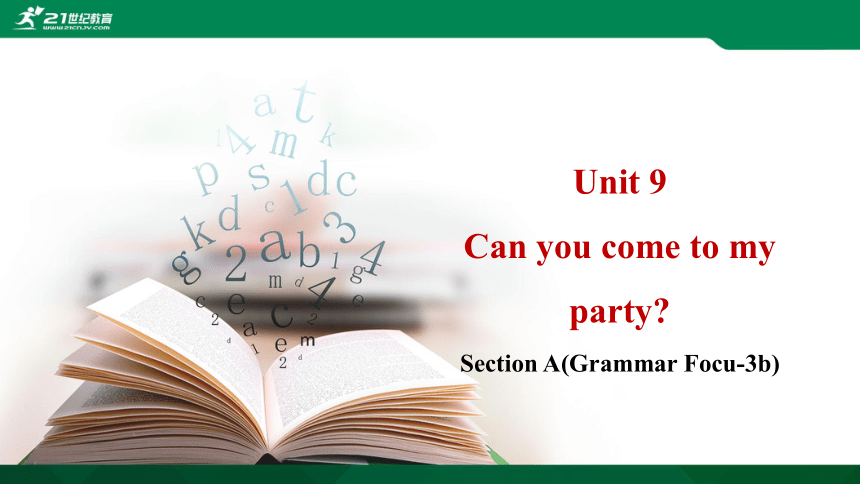 | |
| 格式 | zip | ||
| 文件大小 | 1.8MB | ||
| 资源类型 | 试卷 | ||
| 版本资源 | 人教新目标(Go for it)版 | ||
| 科目 | 英语 | ||
| 更新时间 | 2019-11-21 20:57:27 | ||
图片预览

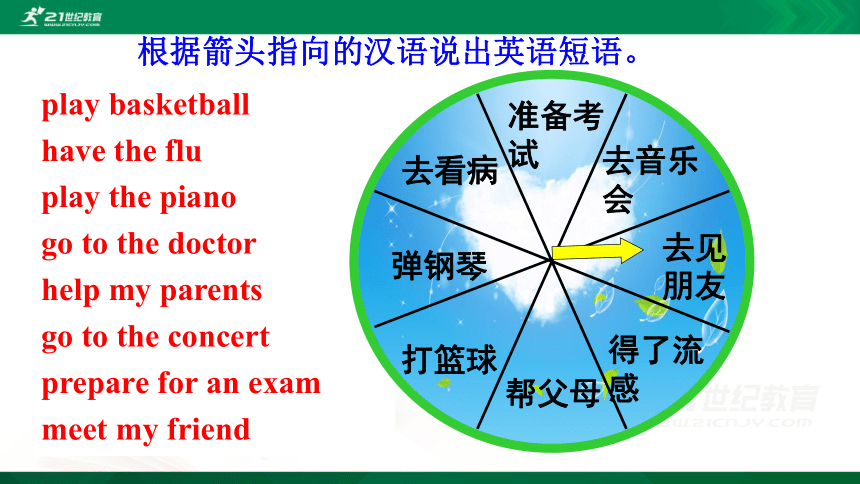

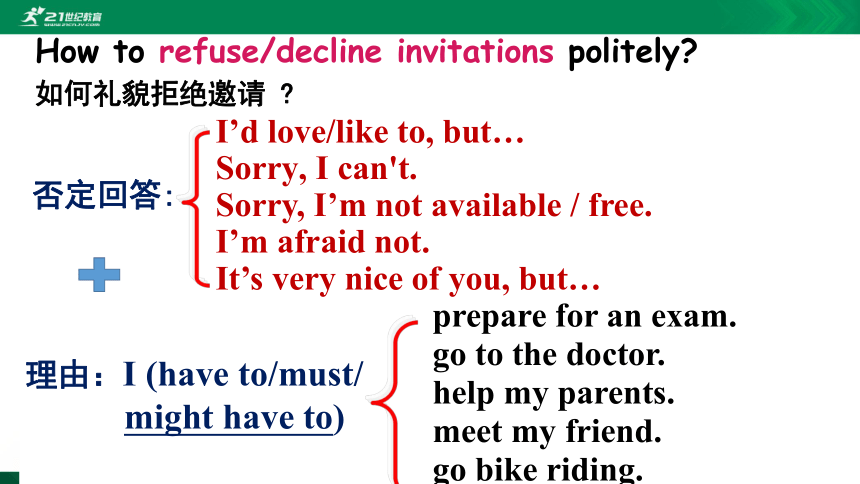
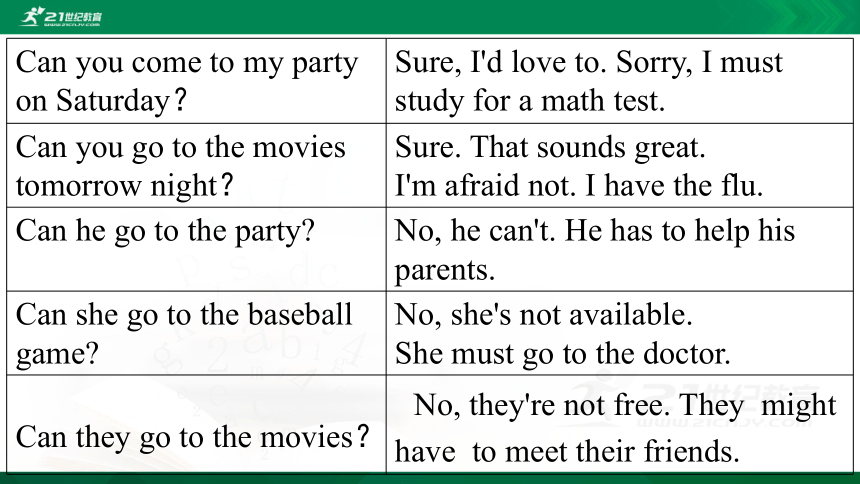
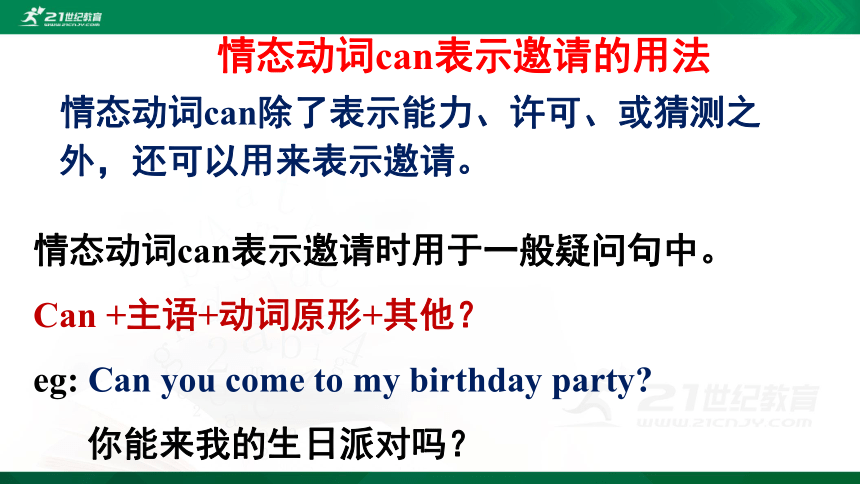
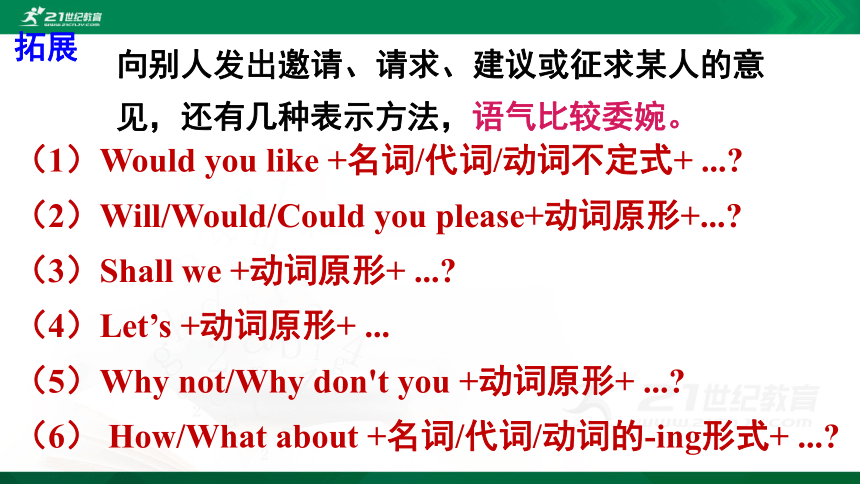
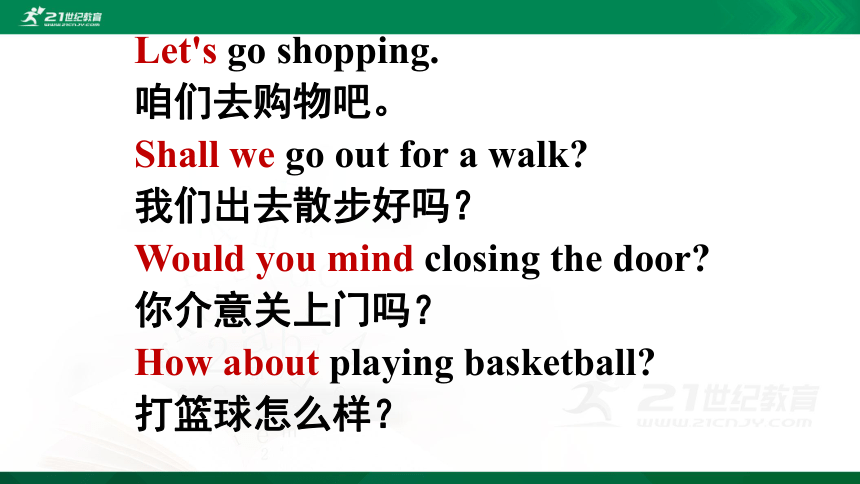
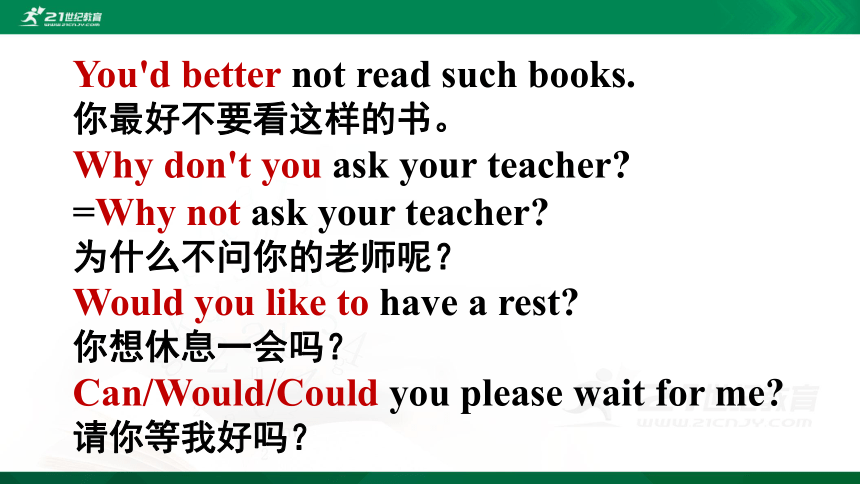
文档简介
(共28张PPT)
Unit 9
Can you come to my party?
Section A(Grammar Focu-3b)
play basketball
have the flu
play the piano
go to the doctor
help my parents
go to the concert
prepare for an exam
meet my friend
弹钢琴
准备考试
去看病
去音乐会
打篮球
帮父母
去见朋友
得了流感
根据箭头指向的汉语说出英语短语。
Sure,I'd love to.
Certainly, I’d like to.
Sure! That sounds great!
Accept an invitation
接受邀请
Sure. Thanks for your invitation.
Sure. Thanks for asking me.
当然,我很乐意去。
How to refuse/decline invitations politely?
如何礼貌拒绝邀请 ?
否定回答:
I’d love/like to, but…
Sorry, I can't.
Sorry, I’m not available / free.
I’m afraid not.
It’s very nice of you, but…
理由:I (have to/must/
might have to)
prepare for an exam.
go to the doctor.
help my parents.
meet my friend.
go bike riding.
…
Can you come to my party
on Saturday? Sure, I'd love to. Sorry, I must study for a math test.
Can you go to the movies tomorrow night? Sure. That sounds great.
I'm afraid not. I have the flu.
Can he go to the party? No, he can't. He has to help his parents.
Can she go to the baseball game? No, she's not available.
She must go to the doctor.
Can they go to the movies? No, they're not free. They might have to meet their friends.
情态动词can表示邀请的用法
情态动词can除了表示能力、许可、或猜测之外,还可以用来表示邀请。
情态动词can表示邀请时用于一般疑问句中。
Can +主语+动词原形+其他?
eg: Can you come to my birthday party?
你能来我的生日派对吗?
向别人发出邀请、请求、建议或征求某人的意见,还有几种表示方法,语气比较委婉。
(1)Would you like +名词/代词/动词不定式+ ...?
(2)Will/Would/Could you please+动词原形+...?
(3)Shall we +动词原形+ ...?
(4)Let’s +动词原形+ ...
(5)Why not/Why don't you +动词原形+ ...?
(6) How/What about +名词/代词/动词的-ing形式+ ...?
拓展
Let's go shopping.
咱们去购物吧。
Shall we go out for a walk?
我们出去散步好吗?
Would you mind closing the door?
你介意关上门吗?
How about playing basketball?
打篮球怎么样?
You'd better not read such books.
你最好不要看这样的书。
Why don't you ask your teacher?
=Why not ask your teacher?
为什么不问你的老师呢?
Would you like to have a rest?
你想休息一会吗?
Can/Would/Could you please wait for me?
请你等我好吗?
Accept invitations
Yes, I’d love/like to.
Certainly, I’d love/like to.
Sure. I’d love/like to.
Sure. It sounds great.
Sure. Thanks for your invitation.
Sure. Thanks for asking me.
Sure. It’s very nice of you.
接受邀请
Refuse invitations
Sorry, I can’t. I have to…
I’d love to, but I have to…
I’m afraid not. I …
Sorry . I’m not free then. I …
I’m sorry. I’m not available. I …
拒绝邀请
must与have to
1.must: 表示说话人的主观看法,即主观上的必要性,
表示命令和愿望。没有人称和数的变化。
e.g.You must finish your homework.
你必须做完你的作业。
2.have to :表示客观需要,即周围的环境、习惯等要求
某人不得不或必须去做某事。有人称和数的变化。
e.g. He has to walk to school every day.
他每天必须走路去上学。
3.have to 否定形式 为 don’t /doesn’t have to,相当于
needn’t,意为“不必”;must 否定形式为 must not,
缩写为 mustn’t,意为“千万不要,禁止”。
e.g.You don’t have to go school today.
你今天不必去学校。
e.g. You mustn’t play with fire.
你千万不要玩火。
4. must 只用于现在时,have to 可用于任何时态。
e.g. I had to get up early yesterday.
我昨天必须早起。
5. 由 must 引导的一般疑问句的否定回答不用mustn’t,
而要用 needn’t 或 don’t/doesn’t have to。
e.g. — Must I finish all the homework today?
我今天必须要完成所有的作业吗?
—Yes, you must.
是的,你必须。
—No, you don’t have to/ needn’t.
不,没有必要。
( ) 1. — Must I do the dishes first?
—No, you____ . You can do your homework first.
A. mustn’t B. doesn’t have to C. needn’t D. must
( ) 2. You _____ take me to the station, my brother’s
taking me.
can’t B. mustn’t C. shouldn’t D. don’t have to
( ) 3. —Must you go to bed before 9:00 every day?
— _____ . I can sleep late on weekends.
Yes, I must B. No, I don’t have to
C. No, I mustn’t D.Yes, I have to .
C
B
D
watch TV, on the weekend, my cousin,
visit my grandparents, practice the violin
1. A: What are you going to do on Saturday?
B: I’m not sure. I might __________.
2. A: What are you planning to do after school?
B: I don’t know. ______________________.
3a
watch TV
I might practice the violin
3. A: When will you finish the science homework?
B: ______________________________.
4. A: Who are you going to the movies with?
B: __________________________.
5. A: Are you free to come to my place on Saturday?
B: ________________________________.
I might finish it on the weekend
I might go with my cousin
Sorry. I might visit my grandparents
1. Inviting: ____________________________
(can/play tennis)
Accepting: ________________________
2. Inviting: _____________________________
(would like to/go to the movies)
Refusing: _____________________
Reasons: ____________________________
(might have to)
3b
Can you play tennis with us?
Sure. I’d love to.
Would you like to go to the movies?
I’m afraid I can’t.
I might have to prepare for the math exam.
3. Inviting: ___________________________
(can/hang out with us tonight)
Refusing: __________________________
Reason: _____________________ (must)
4. Inviting: ___________________________
__________________________ (would
like to / come to my birthday party)
Accepting: _________________________
Sure. I’d love to.
birthday party?
Would you like to come to my
Sorry. I can’t.
I must help my mom at home.
Can you hang out with us tonight?
1.Tony invites us ________ (play) soccer with him tomorrow.
2.He will not refuse ________ (help) you. Don’t worry.
3.Who is making the __________ (invite), do you know?
4. Li Chen asked Fan Bingbing to marry him and she ________ (accept).
5. I’d like you to come to the ________ (open) of our new library on Monday.
to play
to help
invitation
accepted
opening
1. — Can you ________ to my house to watch Nirvana in Fire II(《琅琊榜Ⅱ》)?
—Yes, I’d love to.
A. come B. comes
C. coming D. to come
A
2. —Mum, I play football this afternoon?
— Sure, but you ______finish your homework first.
A. may; could B. can; must
C. can; mustn’t D. may; can’t
3. —Would you like to play football after school?
— ______.I have a lot of homework to do.
A. I’m afraid not B. Enjoy yourself
C. Take your time D. It takes no time
B
A
4. — Would you like to come to dinner tomorrow evening?
— ________
A. Yes, it’s true. B. You really do.
C. It’s upstairs. D. Yes, I’d love to.
D
5.It's time for class. Let's ________and_________for
our Chinese lesson.
A . stop to talk; to prepare
B . stop to talk; preparing
C . stop talking; preparing
D . stop talking; prepare
D
6.—Why are you so tired these days?
—Well, I have ________ work to do.
A. too much B. too many
C. much too D. many too
A
本节课主要情态动词can的用法,以及区别must和have to。
Summary
谢谢
21世纪教育网(www.21cnjy.com) 中小学教育资源网站
有大把高质量资料?一线教师?一线教研员?
欢迎加入21世纪教育网教师合作团队!!月薪过万不是梦!!
详情请看:
https://www.21cnjy.com/help/help_extract.php
Unit 9
Can you come to my party?
Section A(Grammar Focu-3b)
play basketball
have the flu
play the piano
go to the doctor
help my parents
go to the concert
prepare for an exam
meet my friend
弹钢琴
准备考试
去看病
去音乐会
打篮球
帮父母
去见朋友
得了流感
根据箭头指向的汉语说出英语短语。
Sure,I'd love to.
Certainly, I’d like to.
Sure! That sounds great!
Accept an invitation
接受邀请
Sure. Thanks for your invitation.
Sure. Thanks for asking me.
当然,我很乐意去。
How to refuse/decline invitations politely?
如何礼貌拒绝邀请 ?
否定回答:
I’d love/like to, but…
Sorry, I can't.
Sorry, I’m not available / free.
I’m afraid not.
It’s very nice of you, but…
理由:I (have to/must/
might have to)
prepare for an exam.
go to the doctor.
help my parents.
meet my friend.
go bike riding.
…
Can you come to my party
on Saturday? Sure, I'd love to. Sorry, I must study for a math test.
Can you go to the movies tomorrow night? Sure. That sounds great.
I'm afraid not. I have the flu.
Can he go to the party? No, he can't. He has to help his parents.
Can she go to the baseball game? No, she's not available.
She must go to the doctor.
Can they go to the movies? No, they're not free. They might have to meet their friends.
情态动词can表示邀请的用法
情态动词can除了表示能力、许可、或猜测之外,还可以用来表示邀请。
情态动词can表示邀请时用于一般疑问句中。
Can +主语+动词原形+其他?
eg: Can you come to my birthday party?
你能来我的生日派对吗?
向别人发出邀请、请求、建议或征求某人的意见,还有几种表示方法,语气比较委婉。
(1)Would you like +名词/代词/动词不定式+ ...?
(2)Will/Would/Could you please+动词原形+...?
(3)Shall we +动词原形+ ...?
(4)Let’s +动词原形+ ...
(5)Why not/Why don't you +动词原形+ ...?
(6) How/What about +名词/代词/动词的-ing形式+ ...?
拓展
Let's go shopping.
咱们去购物吧。
Shall we go out for a walk?
我们出去散步好吗?
Would you mind closing the door?
你介意关上门吗?
How about playing basketball?
打篮球怎么样?
You'd better not read such books.
你最好不要看这样的书。
Why don't you ask your teacher?
=Why not ask your teacher?
为什么不问你的老师呢?
Would you like to have a rest?
你想休息一会吗?
Can/Would/Could you please wait for me?
请你等我好吗?
Accept invitations
Yes, I’d love/like to.
Certainly, I’d love/like to.
Sure. I’d love/like to.
Sure. It sounds great.
Sure. Thanks for your invitation.
Sure. Thanks for asking me.
Sure. It’s very nice of you.
接受邀请
Refuse invitations
Sorry, I can’t. I have to…
I’d love to, but I have to…
I’m afraid not. I …
Sorry . I’m not free then. I …
I’m sorry. I’m not available. I …
拒绝邀请
must与have to
1.must: 表示说话人的主观看法,即主观上的必要性,
表示命令和愿望。没有人称和数的变化。
e.g.You must finish your homework.
你必须做完你的作业。
2.have to :表示客观需要,即周围的环境、习惯等要求
某人不得不或必须去做某事。有人称和数的变化。
e.g. He has to walk to school every day.
他每天必须走路去上学。
3.have to 否定形式 为 don’t /doesn’t have to,相当于
needn’t,意为“不必”;must 否定形式为 must not,
缩写为 mustn’t,意为“千万不要,禁止”。
e.g.You don’t have to go school today.
你今天不必去学校。
e.g. You mustn’t play with fire.
你千万不要玩火。
4. must 只用于现在时,have to 可用于任何时态。
e.g. I had to get up early yesterday.
我昨天必须早起。
5. 由 must 引导的一般疑问句的否定回答不用mustn’t,
而要用 needn’t 或 don’t/doesn’t have to。
e.g. — Must I finish all the homework today?
我今天必须要完成所有的作业吗?
—Yes, you must.
是的,你必须。
—No, you don’t have to/ needn’t.
不,没有必要。
( ) 1. — Must I do the dishes first?
—No, you____ . You can do your homework first.
A. mustn’t B. doesn’t have to C. needn’t D. must
( ) 2. You _____ take me to the station, my brother’s
taking me.
can’t B. mustn’t C. shouldn’t D. don’t have to
( ) 3. —Must you go to bed before 9:00 every day?
— _____ . I can sleep late on weekends.
Yes, I must B. No, I don’t have to
C. No, I mustn’t D.Yes, I have to .
C
B
D
watch TV, on the weekend, my cousin,
visit my grandparents, practice the violin
1. A: What are you going to do on Saturday?
B: I’m not sure. I might __________.
2. A: What are you planning to do after school?
B: I don’t know. ______________________.
3a
watch TV
I might practice the violin
3. A: When will you finish the science homework?
B: ______________________________.
4. A: Who are you going to the movies with?
B: __________________________.
5. A: Are you free to come to my place on Saturday?
B: ________________________________.
I might finish it on the weekend
I might go with my cousin
Sorry. I might visit my grandparents
1. Inviting: ____________________________
(can/play tennis)
Accepting: ________________________
2. Inviting: _____________________________
(would like to/go to the movies)
Refusing: _____________________
Reasons: ____________________________
(might have to)
3b
Can you play tennis with us?
Sure. I’d love to.
Would you like to go to the movies?
I’m afraid I can’t.
I might have to prepare for the math exam.
3. Inviting: ___________________________
(can/hang out with us tonight)
Refusing: __________________________
Reason: _____________________ (must)
4. Inviting: ___________________________
__________________________ (would
like to / come to my birthday party)
Accepting: _________________________
Sure. I’d love to.
birthday party?
Would you like to come to my
Sorry. I can’t.
I must help my mom at home.
Can you hang out with us tonight?
1.Tony invites us ________ (play) soccer with him tomorrow.
2.He will not refuse ________ (help) you. Don’t worry.
3.Who is making the __________ (invite), do you know?
4. Li Chen asked Fan Bingbing to marry him and she ________ (accept).
5. I’d like you to come to the ________ (open) of our new library on Monday.
to play
to help
invitation
accepted
opening
1. — Can you ________ to my house to watch Nirvana in Fire II(《琅琊榜Ⅱ》)?
—Yes, I’d love to.
A. come B. comes
C. coming D. to come
A
2. —Mum, I play football this afternoon?
— Sure, but you ______finish your homework first.
A. may; could B. can; must
C. can; mustn’t D. may; can’t
3. —Would you like to play football after school?
— ______.I have a lot of homework to do.
A. I’m afraid not B. Enjoy yourself
C. Take your time D. It takes no time
B
A
4. — Would you like to come to dinner tomorrow evening?
— ________
A. Yes, it’s true. B. You really do.
C. It’s upstairs. D. Yes, I’d love to.
D
5.It's time for class. Let's ________and_________for
our Chinese lesson.
A . stop to talk; to prepare
B . stop to talk; preparing
C . stop talking; preparing
D . stop talking; prepare
D
6.—Why are you so tired these days?
—Well, I have ________ work to do.
A. too much B. too many
C. much too D. many too
A
本节课主要情态动词can的用法,以及区别must和have to。
Summary
谢谢
21世纪教育网(www.21cnjy.com) 中小学教育资源网站
有大把高质量资料?一线教师?一线教研员?
欢迎加入21世纪教育网教师合作团队!!月薪过万不是梦!!
详情请看:
https://www.21cnjy.com/help/help_extract.php
同课章节目录
- Unit 1 Where did you go on vacation?
- Section A
- Section B
- Unit 2 How often do you exercise?
- Section A
- Section B
- Unit 3 I'm more outgoing than my sister.
- Section A
- Section B
- Unit 4 What's the best movie theater?
- Section A
- Section B
- Unit 5 Do you want to watch a game show?
- Section A
- Section B
- Unit 6 I'm going to study computer science.
- Section A
- Section B
- Unit 7 Will people have robots?
- Section A
- Section B
- Unit 8 How do you make a banana milk shake?
- Section A
- Section B
- Unit 9 Can you come to my party?
- Section A
- Section B
- Unit 10 If you go to the party, you'll have a grea
- Section A
- Section B
